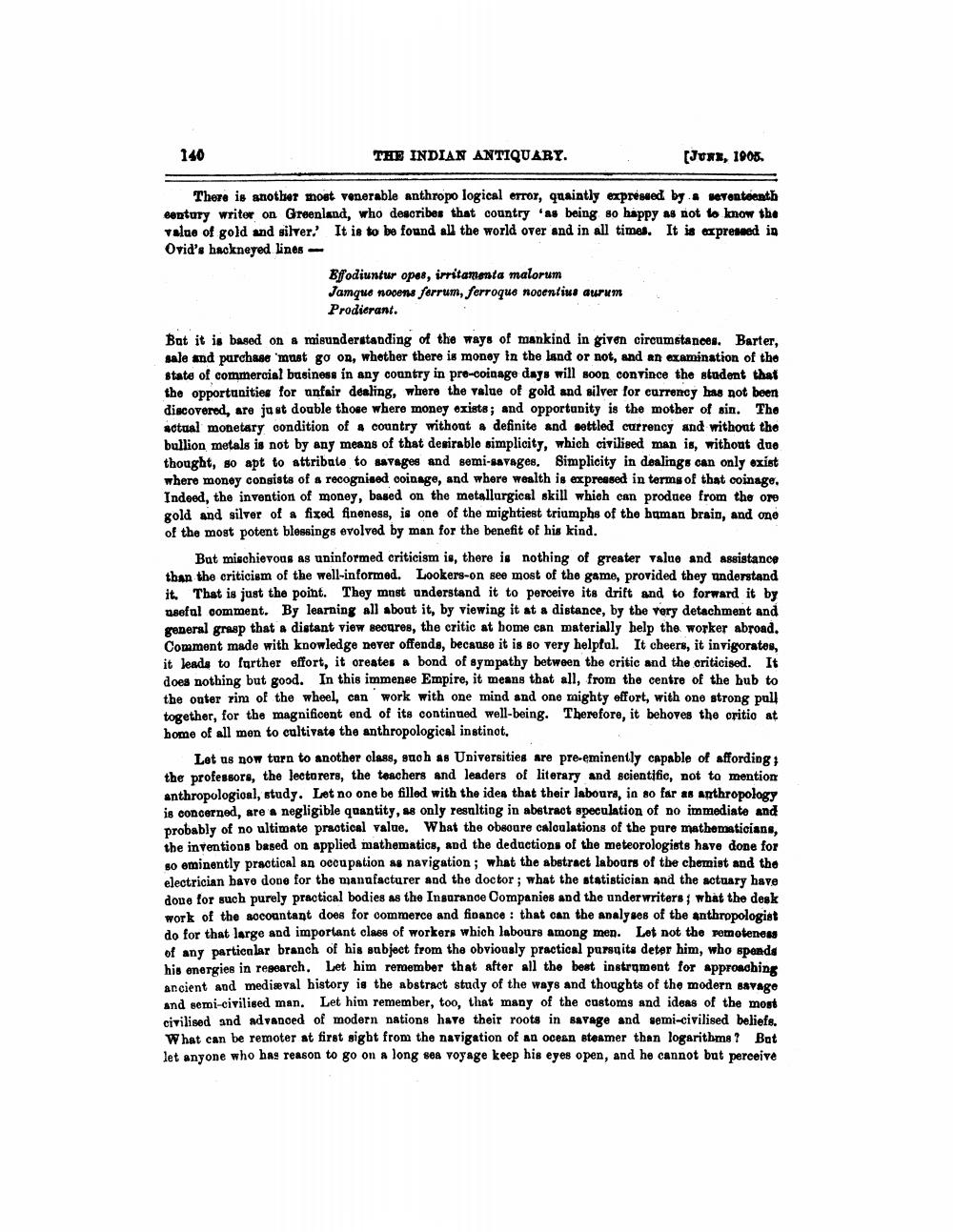________________
THE INDIAN ANTIQUARY.
[JUNE, 1905.
There is another most venerable anthropo logical error, quaintly expressed by a seventeenth eentury writer on Greenland, who describes that country as being so happy as not to know the value of gold and silver.' It is to be found all the world over and in all times. It is expressed in Ovid's hackneyed lines -
140
Effodiuntur opes, irritamenta malorum Jamque nocens ferrum, ferroque nocentius aurum Prodierant.
But it is based on a misunderstanding of the ways of mankind in given circumstances. Barter, sale and purchase 'must go on, whether there is money in the land or not, and an examination of the state of commercial business in any country in pre-coinage days will soon convince the student that the opportunities for unfair dealing, where the value of gold and silver for currency has not been discovered, are just double those where money exists; and opportunity is the mother of sin. The actual monetary condition of a country without a definite and settled currency and without the bullion metals is not by any means of that desirable simplicity, which civilised man is, without due thought, so apt to attribute to savages and semi-savages. Simplicity in dealings can only exist where money consists of a recognised coinage, and where wealth is expressed in terms of that coinage, Indeed, the invention of money, based on the metallurgical skill which can produce from the ore gold and silver of a fixed fineness, is one of the mightiest triumphs of the human brain, and one of the most potent blessings evolved by man for the benefit of his kind.
But mischievous as uninformed criticism is, there is nothing of greater value and assistance than the criticism of the well-informed. Lookers-on see most of the game, provided they understand it. That is just the point. They must understand it to perceive its drift and to forward it by useful comment. By learning all about it, by viewing it at a distance, by the very detachment and general grasp that a distant view secures, the critic at home can materially help the worker abroad. Comment made with knowledge never offends, because it is so very helpful. It cheers, it invigorates, it leads to further effort, it creates a bond of sympathy between the critic and the criticised. It does nothing but good. In this immense Empire, it means that all, from the centre of the hub to the outer rim of the wheel, can work with one mind and one mighty effort, with one strong pull together, for the magnificent end of its continued well-being. Therefore, it behoves the critic at home of all men to cultivate the anthropological instinct,
Let us now turn to another class, such as Universities are pre-eminently capable of affording; the professors, the lecturers, the teachers and leaders of literary and scientific, not to mention anthropological, study. Let no one be filled with the idea that their labours, in so far as anthropology is concerned, are a negligible quantity, as only resulting in abstract speculation of no immediate and probably of no ultimate practical value. What the obscure calculations of the pure mathematicians, the inventions based on applied mathematics, and the deductions of the meteorologists have done for so eminently practical an occupation as navigation; what the abstract labours of the chemist and the electrician have done for the manufacturer and the doctor; what the statistician and the actuary have done for such purely practical bodies as the Insurance Companies and the underwriters; what the desk work of the accountant does for commerce and finance: that can the analyses of the anthropologist do for that large and important class of workers which labours among men. Let not the remoteness of any particular branch of his subject from the obviously practical pursuits deter him, who spends his energies in research. Let him remember that after all the best instrument for approaching ancient and medieval history is the abstract study of the ways and thoughts of the modern savage and semi-civilised man. Let him remember, too, that many of the customs and ideas of the most civilised and advanced of modern nations have their roots in savage and semi-civilised beliefs. What can be remoter at first sight from the navigation of an ocean steamer than logarithms? Bat let anyone who has reason to go on a long sea voyage keep his eyes open, and he cannot but perceive




